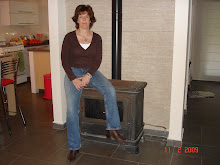Once again, I have to admit I am at a loss to explain this. As far as I can tell it is very contradictory.
Many married, religious Jewish women cover their heads for modesty. They believe that the only person who should see the married woman's hair is her husband. I know other women who cover their heads because they like the fact that it signifies that they are married and their interaction with men is now noticeably more removed than they might have been when they were single.
Many people believe that Jewish law requires married women to cover their hair but as I mentioned in a previous post, this is Judaism and of course, there is another opinion. The whole basis for the law is a phrase in the Torah that refers to a woman who is being disciplined. She has her hair "shaken loose" -- and from that, some people figure she must have previously had it covered. At best, the Torah hints at the hair covering.
I think you can find meaning in a bowl of alphabet soup if you look long and hard enough.
Okay, so back to the wig. Many religious women choose wigs as their head covering of choice. Frankly, I don't blame them. If I was a head-coverer I would probably do that too. Why? Because every woman that I know who wears a wig looks a zillion times better in her wig that she does in her real hair!!! You should see some of these wigs. They cost a lot of money and their owners spend hours taking care of them. They have them coloured, styled and combed out regularly. If you spent that sort of money on something and then you parked it on top of your head, you would expect to take care of it.
Which brings me back to the point. If these women are covering their heads for modesty's sake, doesn't looking better than nature provided defeat the point?
Thursday, February 12, 2009
Wednesday, February 11, 2009
Do the clothes make the woman?
Today I tried a fashion experiment. I had a meeting in Tel Aviv at a start-up E-Commerce company. If there was a 40-year-old working there, I would be shocked. Even a 35-year-old would be a virtual human artifact in that environment. In fact I think that at least half of the employees there ran away from home and turned their hacking skills into respectable positions.
So, needless to say, I am ancient by the company's employment standards. And as if that isn't enough, I am a Modern Orthodox older woman. I only mention that by way of saying that I normally wear skirts and not pants. In Israel, people can tell if you are religious by the clothes you wear. In other words, I couldn't be less cool in that world if I tried.
That's why I decided to go to today's meeting in blue jeans, high leather boots with pointed toes and a long-sleeved T-shirt. Frankly, I think I was the epitome of 47-year-old cool. My husband (perhaps not the best judge under the circumstances) said that I looked the way he remembered me when we met!!!
I was trying to determine whether people see me differently when I dress differently -- or not.
The guy I was meeting with is a guy I have been doing work with for about three years now. To him, I am old in a generic way (you know, can't work when the kids are on vacation or it's a jewish holiday) and I doubt he noticed one way or the other. But when I met the CEO of the start-up -- I swear he was 30 tops if he was a day -- I am convinced that things played out as well as they did because I just seemed inexplicably regular and normal.
When I returned home my husband asked me how my experiment turned out. I didn't really know what to tell him. He thinks that I created this issue in my head. My same-aged professional, religious, women friends, all disagree with him. We sense that we are considered over-the-hill when we are in a work environment. It may not be something tangible, but it is definitely there. And we aren't stupid; we know that all of those companies can hire sweet young things almost half our age (and for a lot less money). They won't have our smarts or experience, but in this cool new world, no one seems to care.
So, needless to say, I am ancient by the company's employment standards. And as if that isn't enough, I am a Modern Orthodox older woman. I only mention that by way of saying that I normally wear skirts and not pants. In Israel, people can tell if you are religious by the clothes you wear. In other words, I couldn't be less cool in that world if I tried.
That's why I decided to go to today's meeting in blue jeans, high leather boots with pointed toes and a long-sleeved T-shirt. Frankly, I think I was the epitome of 47-year-old cool. My husband (perhaps not the best judge under the circumstances) said that I looked the way he remembered me when we met!!!
I was trying to determine whether people see me differently when I dress differently -- or not.
The guy I was meeting with is a guy I have been doing work with for about three years now. To him, I am old in a generic way (you know, can't work when the kids are on vacation or it's a jewish holiday) and I doubt he noticed one way or the other. But when I met the CEO of the start-up -- I swear he was 30 tops if he was a day -- I am convinced that things played out as well as they did because I just seemed inexplicably regular and normal.
When I returned home my husband asked me how my experiment turned out. I didn't really know what to tell him. He thinks that I created this issue in my head. My same-aged professional, religious, women friends, all disagree with him. We sense that we are considered over-the-hill when we are in a work environment. It may not be something tangible, but it is definitely there. And we aren't stupid; we know that all of those companies can hire sweet young things almost half our age (and for a lot less money). They won't have our smarts or experience, but in this cool new world, no one seems to care.
Monday, February 9, 2009
What happens when you die?
Well, I surely don't know. That is precisely why I started saying The Mourner's Kaddish, a Jewish prayer in honour of the dead when my father recently died. It is frequently assumed that "saying Kaddish" is the bastion of men. Most prayer obligations in Judaism are.
The idea is that each time the mourner says Kaddish, it elevates the deceased person's soul. Now obviously we have no way of knowing if that is in fact the case or not. Committed religious people insist that it is. But, really, how do they know for sure? No one has ever come back to confirm or deny that it works.
It works essentially like this. When your parent dies, the male child or children are supposed to say Kaddish three times a day for 11 months. After a designated period of time, there is no possible room to elevate the soul and the deceased person's slate is clean so that they can now go to The World To Come.
In the event that there is no male child, it seems to me that the standard procedure is either that the husband of the daughter says Kaddish or (and this is looked upon with disdain in many communities), the daughter pays someone to say Kaddish who is going to go to synagogue anyway.
However, as with everything in Judaism, there is more than one opinion. After a bit of looking around, I found out that there are some who believe that it is better for a natural born child of the deceased to say Kaddish -- even if that child is not a male child!!!! Good enough for me.
I knew that my brother would never say Kaddish to the extent that I felt it should be said, so I decided to do it myself. No one in my immediate family cares if I do this or not. When I told my mother that I was saying Kaddish everyday, she said: "Oh that's nice." I didn't even bother to tell my brother or sister. They would just think it was part of my Holy Roller needs.
I am also not trying to make a feminist point or hold myself out as something special. I am just concerned that since I don't know what happens after we die, that I better not leave a stone unturned. I don't want my father's soul sitting at the bottom of the barrel because no one took the time to help move it to the World To Come. And until someone can prove to me that such a place does not exist, why take the chance?
The idea is that each time the mourner says Kaddish, it elevates the deceased person's soul. Now obviously we have no way of knowing if that is in fact the case or not. Committed religious people insist that it is. But, really, how do they know for sure? No one has ever come back to confirm or deny that it works.
It works essentially like this. When your parent dies, the male child or children are supposed to say Kaddish three times a day for 11 months. After a designated period of time, there is no possible room to elevate the soul and the deceased person's slate is clean so that they can now go to The World To Come.
In the event that there is no male child, it seems to me that the standard procedure is either that the husband of the daughter says Kaddish or (and this is looked upon with disdain in many communities), the daughter pays someone to say Kaddish who is going to go to synagogue anyway.
However, as with everything in Judaism, there is more than one opinion. After a bit of looking around, I found out that there are some who believe that it is better for a natural born child of the deceased to say Kaddish -- even if that child is not a male child!!!! Good enough for me.
I knew that my brother would never say Kaddish to the extent that I felt it should be said, so I decided to do it myself. No one in my immediate family cares if I do this or not. When I told my mother that I was saying Kaddish everyday, she said: "Oh that's nice." I didn't even bother to tell my brother or sister. They would just think it was part of my Holy Roller needs.
I am also not trying to make a feminist point or hold myself out as something special. I am just concerned that since I don't know what happens after we die, that I better not leave a stone unturned. I don't want my father's soul sitting at the bottom of the barrel because no one took the time to help move it to the World To Come. And until someone can prove to me that such a place does not exist, why take the chance?
Subscribe to:
Comments (Atom)




